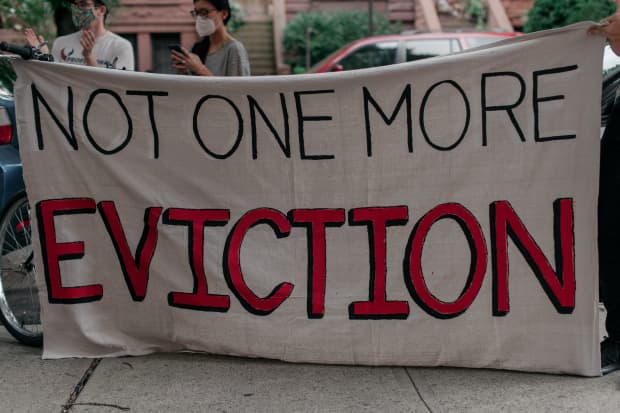This post was originally published on this site

NEW YORK, NY – JULY 31: Housing activists gather to protest alleged tenant harassment by a landlord and call for cancellation of rent in the Crown Heights neighborhood on July 31, 2020 in Brooklyn, New York. (Photo by Scott Heins/Getty Images)
The Trump administration might be able to extend the federal moratorium on tenant evictions unilaterally, House Speaker Nancy Pelosi said Wednesday.
The eviction moratorium, put in place by the CARES Act in March, formally expired July 25, according to the Department of Housing and Urban Development, but because a 30-day notice of eviction is required to be served to tenants, the practical date of the moratorium’s end is Aug. 24, according to a Congressional Research Service report.
White House Chief of Staff Mark Meadows and U.S. Treasury Secretary Steven Mnuchin put the moratorium and reviving a federal add-on payment to state jobless benefits at the top of their to-do list when they began face-to-face talks with Democratic leaders last week.
“He may be able to extend the moratorium on evictions, but unless you have some money with that, it’s helpful but it’s not the whole thing,” Pelosi said in a televised interview Tuesday. Pelosi met with Mnuchin and Meadows on Tuesday and they confirmed then the White House was looking at what actions it could take on the moratorium and the unemployment payments through executive orders or other means without congressional approval.
“Again, you can’t do the money without the Congress of the United States. The power of the purse begins in the House,” Pelosi said.
Read more: White House, Democrats agree to try to reach coronavirus-aid deal by week’s end
The U.S. Department of Housing and Urban Development has already extended one anti-eviction deadline included in the CARES Act. In June, the department said it was extending the moratorium on foreclosures and evictions for homeowners with Federal Housing Administration-insured single family mortgages.
The recently expired moratorium deadline applied to residents in public housing, using federal housing vouchers and in FHA-insured multifamily buildings.

